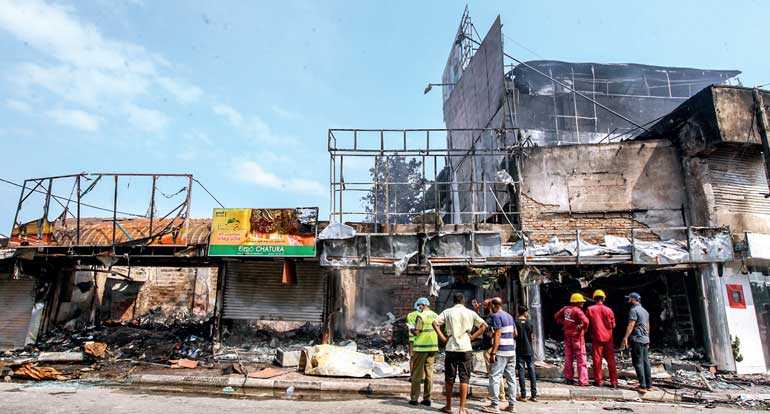Wednesday Feb 18, 2026
Wednesday Feb 18, 2026
Monday, 3 June 2019 00:00 - - {{hitsCtrl.values.hits}}

Sri Lanka is in a strategic location of the Indian Ocean. Throughout the history of Sri Lanka there were foreign interventions. Sri Lanka was invaded constantly by the foreign forces from south India initially and later by European forces. In certain instances, Sinhala kings invaded south India and Parakramabahu the Great (1123-1186) had gone to the extent of invading Burma. Sinhala kings came to treaties with Pandyan kings against the Cholas.
In the 17th Century during the time of Rajasinghe II (1608-1687), assistance of the Dutch was sought to defeat the Portuguese and it was done in 1656. However, Rajasinghe realised that the Dutch replaced the Portuguese as a colonial power in the low country districts, previously occupied by Portuguese. Hence the origin of the Sinhala proverb, exchanging ginger with chilies.

J.R. Jayewardene in 1977 opened the economy and had connections with the western powers. Indira Gandhi, who was in the opposition of India, came back into power in 1980. India had a treaty with USSR for friendship and cooperation and was following a closed economic model. Indira Gandhi did not like the outlook of the Jayewardene government and she thought that Sri Lankan government would be a threat to the defence of India. Therefore, it was a necessity in the eyes of Indian Government to destabilise the Sri Lankan Government.
As a result, when Sri Lanka had a problem with Tamil minorities, India provided its soil for the military training of the militant minority Tamil youth of Sri Lanka. Tamil Nadu being a province of Tamils created sufficient ground support for this exercise.
During those days where the Sri Lankan ethnic issue was in a constant rise, Tamil Nadu had a considerable influence on the Indian central government towards its Sri Lankan policy. Professor Ralph Buultjens once said the Chief Minister of Tamil Nadu was ‘the’ key person of this whole affair. When the Sri Lankan forces led by field commander Denzil Kobbekaduwa, were advancing and when there was an imminent threat of the defeat of the Liberation Tigers, India tried to send humanitarian aid to Jaffna by sea.
When they were turned back by the Sri Lankan Navy, India took an unprecedented action of violation of the Sri Lankan air space and dropped humanitarian aid to the Jaffna peninsula. At this point the Western friends of Jayewardene advised him to liaise with India and sort the issue out. The action of India was not protested internationally. As a result, the military operation of Kobbekaduwa was halted and Indo Lanka pact was signed.
Firstly, if Jayewardene was able to handle India effectively India would not have interfered with domestic affairs of Sri Lanka. Secondly if Jayewardene has treated the minorities of Sri Lanka with dignity, he could have given no ammunition to India to meddle with internal affairs of Sri Lanka.
Sri Lanka had a problem of balancing Indian influence. Neville Jayaweera reported that one time powerful Secretary to the Ministry of Defence and Foreign Affairs N.Q. Dias wanted to develop relationships with China in 1960s to counter the Indian influence. However, during the time of Sirimavo Bandaranaike foreign policy of Sri Lanka was well managed in the guidelines of non-alignment. She had very good relationship with India and was able to sign the Sirima-Shastri pact with the Indian Prime Minister and was able to secure Katchatheevu Island for us. Yet she was bold enough to allow Pakistani planes to use Sri Lankan air space during the time of Indo Pakistan war in 1971. It was true non-alignment.
During the time of the last stages of the war in Sri Lanka, Rajapaksa government had a close relationship and understanding with the Indian government. However, at that time the political situation was completely changed in India after the assassination of Rajiv Gandhi by the LTTE. Therefore, the Chief Minister of Tamil Nadu has ceased to be an influential figure in relations with Sri Lanka. In fact, India also wanted to eliminate the LTTE. Hence Rajapaksa did not face the crucial situation faced by Jayewardene.
Soon after the ending of war Rajapaksa did not abide by the promises he made to India and world community that he would address the grievances of Tamils in Sri Lanka. When the Indian pressure was mounting up, he turned to China. The Chinese Government which helped Sri Lanka during the war as well, helped Sri Lanka by way of granting loans for development. The end result was selling the land which occupies Shangri-La Hotel in Colombo and allowing freehold right of a portion of the land to be reclaimed at Port City project. Rajapaksa also did the same mistake of Jayewardene by not treating the Tamil community with dignity and thereby paving the way for foreign influences.
Dr. Ajith Kolonne has given an interview to Ravaya (19 May) and said that Prof. Patrick Mendis of US government service revealed that when US forces came into the territory of Pakistan to kill Osama Bin Laden, US did not violate sovereignty of Pakistan since there was an agreement called Acquisition and Cross-Servicing Agreement (ACSA) between US and Pakistan. Even at that time similar agreement was signed between USA and Sri Lanka and it was signed by Robert O Blake, US Ambassador and Gotabaya Rajapaksa, Secretary to the Ministry of Defence. It was not revealed to the Parliament.
Vasudeva Nanayakkara came to know about this and inquired from Mahinda Rajapaksa, the President. He had brushed it off saying that it was just an agreement signed by a Ministry Secretary. Sunday Times (19 May) revealed that after the lapse of the previous agreement the present government signed a fresh agreement extended to 80 pages signed by Atul Keshap, US Ambassador and Kapila Waidyaratne, Secretary to the Ministry of Defence. According to the agreement USA and Sri Lanka have reciprocal logistics support in the case of military exercises.
When Sri Lanka was burning recently the President was ‘summoned’ to China to sign a defence agreement. According to the agreement as reported by newspapers China can send armed military officers to defend Chinese interests in Sri Lanka. While signing this serious agreement the President was in begging mindset. It was reported that he requested 100 jeeps instead of 50 jeeps previously planned.
Sri Lanka being a small country should be very careful when dealing with foreign countries, especially when rival forces are in operation. Ukraine, sometime back, was in between US and Russian influences and at the end Ukraine lost Crimea to Russia.
During the past we had to face regional geopolitics but today the situation is quite different. Global geopolitics is at our doorstep. USA treats China as its main opponent and waged a trade war against China as well. American foreign policy is derived from its defence policy. They do not all the time support democratic and free market-oriented governments. They support anybody who is willing to serve their global interests at that point.
Trying to make deals out of this type of situation is dangerous. If you are in the middle of rival forces that may cost you a part of your territory. It is walking in a tightrope. Intelligent diplomats should be principled and firm and should not try to get benefits out of the auctioned position he is in. The best foreign policy advocate we had in recent times was Sirimavo Bandaranaike. Act of Rajasinghe II was a failure. Now it is not exchanging ginger with chilies. It is a combined dose of ginger and chilies. If Sri Lanka is not divided by way of ethnicity and religion that would be the best internal defence we would have in this type of troubled times.